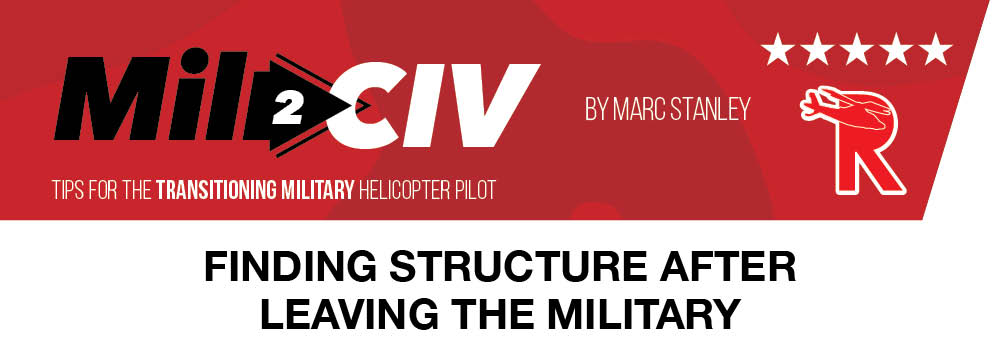|
Nov
16
2023
|
|
Posted 2 years 107 days ago ago by Admin
|
|

By Marc Stanley
Transitioning from military to civilian life can be a difficult process, especially when it comes to finding structure. Trust me, it is stressful no matter how prepared you are, and I can guarantee at some point you will ask yourself, “What have I done?” After spending years serving in an environment with clear rules and expectations, it can be overwhelming to enter a world with less structure and more ambiguity. Military service is an experience unlike any other, and transitioning from active duty to civilian life presents many challenges. After leaving the structured environment of military life, veterans may struggle to adjust and find purpose in a new setting. The transition can be even more difficult for those who entered the military fresh out of high school, as they may need to learn basic life skills for the first time.
One of the best ways to create structure is by setting goals and creating routines. Setting measurable goals allows you to stay focused on what you want to accomplish each day, while creating daily routines helps you stay organized and productive. This way, even if there isn’t an overarching sense of structure in your day-to-day life, your own plans can provide a foundation for success as you transition into civilian life.
Various physical and mental health complications can make the transition even tougher for veterans. To make this process smoother, veterans should take advantage of resources such as professional development courses, career services, veteran support networks and reaching out to fellow veterans that have similar experiences and reach out to people who have recently gone through the transition. Additionally, maintaining healthy habits such as getting enough sleep, exercising, and eating balanced meals will go a long way as well.
You don’t need to go through the transition alone! Reach out for support from family and friends who understand what you’re going through. They can provide encouragement and advice on how they found their own way back into the civilian sector. Additionally, there are many organizations that offer resources specifically tailored towards veterans transitioning into civilian life—including career counseling services, workshops, job fairs and more. Taking advantage of these resources is a great way to make sure that your transition is as smooth as possible.
It's important to note that while transitioning involves challenge and stress, it must be differentiated from post-traumatic stress disorder (PTSD). PTSD is a psychological disorder that has much more significant implications on a person's social, mental, and physical well-being. Anyone can develop PTSD, but due to the specific rigors of military life, veterans are at an especially high risk. Risk factors include exposure to combat or terrorism, experiencing physical trauma or assault or witnessing the death or serious injury of someone close.
When making the switch from military to civilian life, it's important to learn how to effectively manage your time so that you can balance work with other areas of your life like leisure activities and education. Consider using tools like calendars or productivity apps that keep track of tasks or break down larger projects into smaller ones; this will make it easier for you to stay organized and on top of things during such a big change in lifestyle.
Moving away from the structure provided by military service can be intimidating, but it doesn’t have to be. By creating goals and developing routines for yourself, reaching out for support from family, fellow veterans that transitioned, veteran organizations, attending industry events like Rotor Pro’s HeliSUCCESS and HAI’s Mil2Civ Transition Seminar, and organizing your time with helpful tools like calendars or productivity apps; you can create structure in your new post-military lifestyle! With dedication and hard work, transitioning into civilian life will become easier over time. Before long, you may even find that having more freedom brings more opportunity than ever!
READ MORE ROTOR PRO: https://justhelicopters.com/Magazine
WATCH ROTOR PRO YOUTUBE CHANNEL: https://buff.ly/3Md0T3y
You can also find us on
Instagram - https://www.instagram.com/rotorpro1
Facebook - https://www.facebook.com/rotorpro1
Twitter - https://twitter.com/justhelicopters
LinkedIn - https://www.linkedin.com/company/rotorpro1